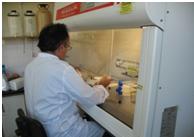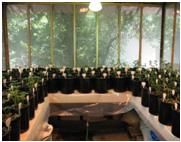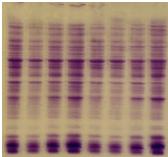Laboratory of BACTERIOLOGY
The special phytopathological field of work of the Laboratory of Bacteriology encompasses: scientific research for the acquirement of basic knowledge on bacteriological diseases, diagnostic services related to plant health problems caused by bacteria or phytoplasmas, as well as educational activities in relation to training of agronomists, growers and students.

 Research activities:
Research activities:
- Studies related to plant-pathogen (bacteria, phytoplasmas) interactions
- Studies on the biology, epidemiology and biodiversity of the most important bacterial pathogens and phytoplasmas observed in Greece
- Development and application of diagnostic techniques (Immunofluorescence, PCR, RFLP, RAPDs, FISH, SDS-PAGE, Real-time PCR, microarrays) for rapid and reliable detection and identification of phytopathogenic bacteria and phytoplasmas; participation in European projects of Inter-Laboratory bacteriological assays (Ring-Tests)
- Development of effective and environmentally-safe biotechnological tools for the control of plant diseases, using modern methods of molecular biology and genetics
- Development of new methods of plant protection using substances extracted from byproducts of plant crops as well as other plant defense elicitors. This is done within the framework of a sustainable approach to agricultural development, and of restricting the introduction of agro-industrial pollutants in the environment
- Investigation into genetic resources for resistance of cultivated plants against bacterial pathogens
- Development of new Pest Risk Analysis (PRA) schemes for quarantine and emerging phytopathogenic bacteria. These schemes include quantitative and qualitative risk estimation, as well as the evaluation of risk management options
- Participation in international scientific networks focused on: bacterial diseases of stone fruit and nut crops, induction of plant resistance to phytopathogens and coordination at the EU level of national phytosanitary research programs
Current phytopathological services:
- Diagnosis of diseases of all agricultural crops caused by bacterial pathogens or phytoplasmas, and up-to-date control recommendations in regard to plant samples sent to the Institute by the Services of the Ministry of Rural Development & Food, agricultural cooperatives and growers
- Laboratory phytosanitary control of imported propagating and non-propagating plant material (potato tubers, seeds, cuttings, etc) for the detection of quarantine phytopathogenic bacteria according to national and EU legislation, using internationally recognized, validated protocols
- Laboratory examination of plant material, water or soil for the presence of quarantine bacterial pathogens and phytoplasmas. This examination is included in
the official Survey Program of agricultural crops in Greece aiming at the recognition of protected zones, according to national and EU legislation
- Preparation of guidance documents on sampling procedures and visual inspection of agricultural crops, to be used by the phytosanitary inspectors involved in the official Survey Program of agricultural crops. The guidance documents on visual inspection are to be used by growers as well.
- Conducting Pest Risk Analysis (PRA) on quarantine phytopathogenic bacteria commissioned by the Ministry of Rural Development & Food, and the European and Mediterranean Plant Protection Organization (EPPO)
- Educational activities: a) Invited lecturers in Plant Pathology, Microbiology, Biotechnology in Greek Universities, theoretical seminars and practical training for agronomists of the Ministry of Rural Development & Food (or the Regional Administration) on aspects of diagnosis of bacterial diseases and phytosanitary control, b) supervision of the practical stage and the preparation of dissertations of students from universities and Technological Educational Institutes (TEI)
- Maintenance and enrichment of the Laboratory’s collection of plant pathogenic bacteria (BPIC). The collection is linked with the Microbial Information Network in Europe (MINE) [contact persons: Maria C. Holeva or Charikleia Karafla]
Scientific laboratory staff
Maria C. Holeva, PhD, Plant Pathologist-Bacteriologist, Senior Researcher, Head of the Laboratory
Charikleia Karafla, Agronomist Technologist
Paraskevas E. Glynos, Agronomist Technologist
Eirini-Foteini Dervisi, PhD, Biologist
Chrysavgi Reppa, MSc, Agronomist
Dimitra Gourgouli MSc, Biologist
Dimitrios N. Perivolaris, MSc, Agronomist Technologist
Athanasios C. Togias, Agronomist Technologist
Georgia Kolliopoulou, Environmental Technologist
Technical assistants
Ioannis I. Loulakidis


